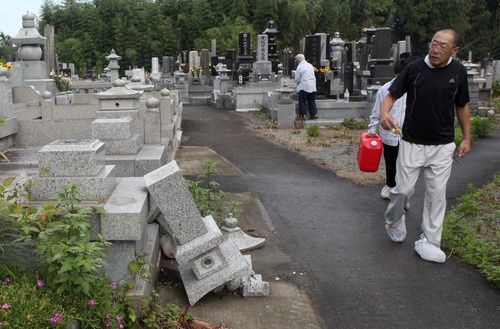
information about Fukushima published in English in Japanese media info publiée en anglais dans la presse japonaise
24 Septembre 2012
September 24, 2012
http://mainichi.jp/english/english/newsselect/news/20120924p2a00m0na018000c.html
IWAKI, Fukushima -- As people across Japan visited graves to honor the dead during the "higan" Autumnal Equinox, nuclear plant worker Masahiro Hiruta held up photos of the wife and daughter he lost to the tsunami triggered by the Great East Japan Earthquake on March 11, 2011.
"Watch over Fukushima's children and families from heaven, so that they'll never have to experience such disasters again," the 45-year-old man said, addressing his late family.
At the time of the quake, Hiruta was working at the No. 5 reactor of the now-stricken Fukushima No. 1 Nuclear Power Plant as a contractor for the plant's operator, Tokyo Electric Power Co. (TEPCO). A concrete wall crumbled, and he escaped outside. When the workers were dismissed an hour later, Hiruta headed to the home he shared with his wife and daughter in the city's Tairausuiso district. The landscape was filled with burnt homes and mountains of rubble.
The next morning, he found parts of his home by the edge of a mountain some 100 meters away from where his house had stood. His daughter Maria's body was found two days later, and his wife Grace's a week later. He says that makes him one of the luckier ones.
Hiruta met his wife at a hostess bar in Iwaki 20 years earlier. He respected her for sending money back to her eight siblings in the Philippines, and wanted to support her. The couple wed in May 1996, and had Maria in August 1998. Having lost his beloved wife and daughter, there are some questions Hiruta can't stop asking himself.
"What if I hadn't gotten married?" he asks. "What if I hadn't bought a house near the ocean?"
After the deaths of Grace and Maria, Hiruta learned from former classmates and other acquaintances how much they had been loved. That has helped him move forward.
"If I were to stay sad, it would make the two of them sad," he says. "I want to be able to leave the city a place where children can live with smiles on their faces."
Hiruta has begun helping out at soup kitchens at temporary housing facilities where his sister Mitsuko works. He's also been attending lectures with her on low-level radiation exposure and other issues. This spring, he planted a cherry tree on the grounds of the school his daughter used to attend in honor of his wife and daughter, who loved cherry blossoms. Says Hiruta: "The kids all tell me, 'Maria is here with us (where the tree is)'."
Hiruta says he can't go near the Fukushima No. 1 nuclear plant anymore. The dangers of radiation have been burned into his mind. Soon, he hopes to start volunteering for decontamination work on roads used by students traveling to and from school.

People wearing shoe covers to protect themselves from radiation contamination are seen visiting their ancestors' graves in the Fukushima Prefecture town of Naraha on Sept. 22 during the Autumnal Equinox, when Japanese Buddhists traditionally honor the dead. (Mainichi)
Changes have been seen in some areas contaminated with radioactive cesium from the stricken nuclear plant. In the prefectural town of Naraha, many residents visited the Dairakuin temple on Sept. 22 to honor their ancestors for the Autumnal Equinox.
With the Aug. 10 lifting of Naraha's no-go zone designation and its shift to the designation of a "zone being prepared for residents' return," residents have been able to enter the town freely. Many were seen visiting the graves of their ancestors, as well as their homes and communities. Still, residents have concerns.
"Even though we can come and go freely, we still can't live here," said Naraha resident Akira Kubota, 61, who looked across the temple where some tombstones were still in disarray. "I worry about who's going to take care of my family's grave from now on."